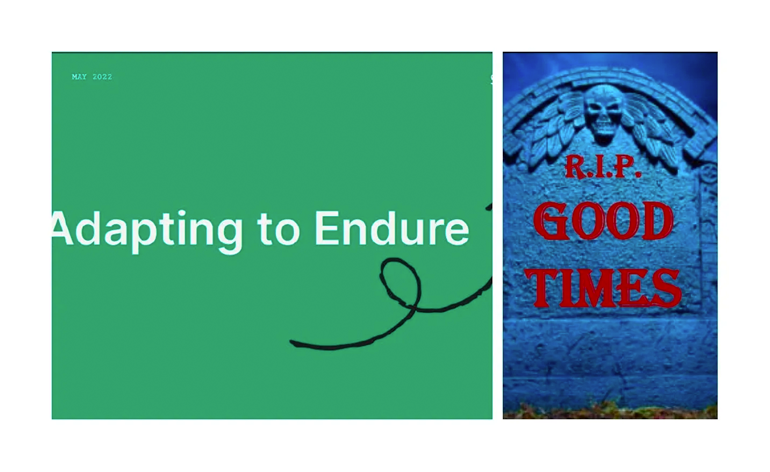
Stickiness
June 19, 2022
The State of the US VC in 1H22 — The Sky is Not Falling
July 10, 2022In May 2022 Sequoia Capital (a well-kwon VC firm) made a 52-page presentation, named “Adapting to Endure”, to share insights with the founders of its portfolio companies into “what is happening and why, and more importantly, what means for you (founders) about the road ahead”.
Even though Sequoia believes “it is not a time to panic”, it thinks that we are in “a Crucible Moment … first and foremost, we must recognize the changing environment and shift our mindset to respond with intention rather than regret”.
I copy below some of Sequoia’s slides titles:
* “Recovery will be long”
* “V-shaped recovery unlikely”
* “Form virtuous to vicious cycle”
* “On the brink of a recession”
* “Consumers buckling under debt”
* “Earnings beginning to roll” down
* “Advertising markets are cracking”
* “Changes in financing environment – venture firms brace for cash crunch – Big investors turn away from VCs”
* “New realities — $15M raise @ $100M post is gone — Series B/C will be smaller raises — Customer uptake will be slower — Cuts are a must — Need to become cash flow positive”
* “Increased challenges – M&As will decrease — Prices will decrease – IPOs will continue to decrease and it will take longer”
Conclusion
In reality, the above quotes are from a different Sequoia’s presentation, “RIP Good Times”, published just after another very challenging moment, the 2008 financial crisis.
Since then, Sequoia and the VC sector as a whole enjoyed their greatest years ever.
As we can see, nobody holds a crystal ball about the future, not even the ultimate insider, as attested by Sequoia’s “RIP Good Times” predictions (“Adapting to Endure” recommendations for bettering management practices are, once more, common knowledge).
However, on the side of the glass half full, there are clear trends and market conditions that I think will continue to favor the VC sector, despite the recent market downturn and anticipated recession.
Firstly, there is the inexorability of the disruptive and exponential impact of technology.
But also importantly, VC has become a mandatory asset class for the utmost deep-pocket investors, the institutional investors (pensions funds, endowments, sovereign wealth funds, etc.), because:
* Institutional investors must achieve at least 7% of annual returns to minimally fulfil their statutory obligations
* And this level of returns cannot be achieved by solely investing in the two largest asset classes:
Equities — they already understood that the wealth creation phase has shifted from public to private markets
Debt — US government high levels of debt and deficit spending will not allow significant interest rates hikes, which shall continue in deep real negative territory




